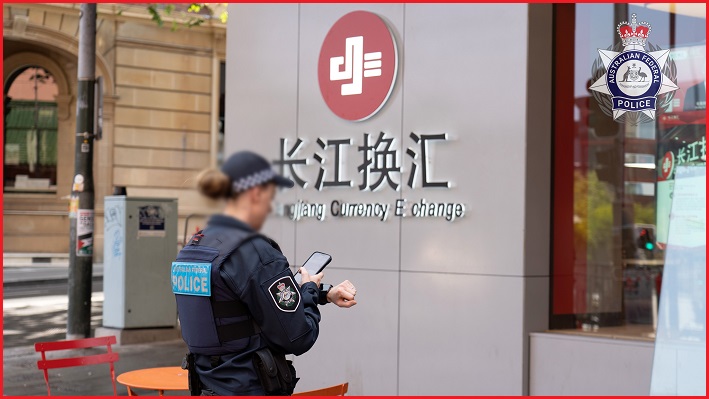The Australian Federal Police (AFP) has busted up a money laundering syndicate that was “operating in plain sight” throughout Australia and had cleaned nearly $230 million in the last three years through a complex web of digital payments and cryptocurrency transfers.
Seven members of the alleged Long River organised-crime group are expected to front up to the Melbourne Magistrate’s Court today following AFP raids around the country in which the police seized over $50 million worth of property, luxury cars, designer handbags, and Rolex watches.
The operation allegedly ran out of the Changjiang Currency Exchange which the AFP claims offered illicit money laundering services to criminal groups to help them move funds earned from cyber scams and the drugs trade into overseas accounts.
AFP Assistant Commissioner Stephen Dametto said officers became suspicious when they noticed Changjiang was still opening new shop fronts at the height of the pandemic.
“During COVID-19, AFP members were still coming into work, and while most of Sydney was a ghost town, alarm bells went off among our money laundering investigators when they noticed Changjiang Currency Exchange opened and updated new and existing shopfronts in the heart of Sydney,” he said.
“It was just a gut feeling – it didn’t feel right. Many international students and tourists had returned home, and there was no apparent business case for Changjiang Currency Exchange to expand.”
Soon, the AFP spun up a working group which sent forensic accountants and undercover operatives in to look around and comb through the currency exchange’s books.
It took 14 months to build the case that led to the execution of search warrants and arrest of four Chinese nationals and three Australian citizens on Wednesday.
“Unlike traditional money laundering organisations that exploit vulnerabilities in the financial sector, the Long River money laundering organisation entrenched itself into the very fabric of the financial services industry, becoming one of the largest independently-owned remitters in the country,” Dametto said.
“We allege that enabled it to exploit vulnerabilities far more easily, and for a period of time. We expect our charges will significantly impact on the amount of illicit money being remitted in and out of Australia in the coming days alone.”
One of the men was arrested for his involvement in a global investment scam that saw Long River launder $100 million in part through the Changjiang Currency Exchange.
He worked for Changjiang and allegedly helped scammers set up the dummy companies and bank accounts they would move money through in an attempt to evade authorities.
The scam mostly had victims in the US and involved messaging people out of the blue on WhatsApp or social media where they built relationships with the victims and encouraged them to start investing on a trading application.
“The majority of the money deposited into Australian bank accounts or remitted by Changjiang Currency Exchange was linked to the exploitation of an investment application called MetaTrader, and other platforms dealing in foreign exchange and cryptocurrencies,” AFP Investigations Commander Kate Ferry said.
“A key feature of the scam was the alleged syndicate’s ability to produce dedicated software, compatible with the legitimate trading platform to misrepresent the true market value of currency rates.”










